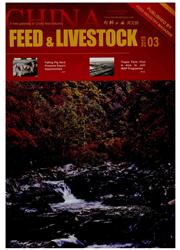

 中文摘要:
中文摘要:
试验通过投饲频率干预后研究军曹鱼对饲料中晶体蛋氨酸(MET)和微胶囊蛋氨酸(RES)的利用效果。试验设置日投饲频率为2、3、4、5次,分别投喂含有MET和RES的饲料,养殖军曹鱼幼鱼[初重(5.40±0.07)g]30 d,测定生长性能、体成分和消化酶活性,评估微胶囊和晶体形式的两种蛋氨酸在不同投饲频率下吸收利用的效率。结果表明,投饲频率未对成活率产生显著影响;MET组和RES组增重率均随投饲频率的增加而增加,投喂5次的RES组显著高于其余各组(P〈0.05);投喂5次RES组肥满度显著高于投喂2次和4次的MET组;投喂5次的MET组全鱼粗蛋白含量显著高于投喂4次和5次的RES组;消化酶活性随着投饲频率增加显著下降(P〈0.05),肝脏总蛋白酶活性随投饲频率增加而增加,5次投喂的MET组总蛋白酶活性显著高于投喂2次的处理组(P〈0.05)。结果表明,增加投喂次数可以改善外源蛋氨酸的利用效果,改善生长。
 英文摘要:
英文摘要:
The effects of exogenous methionine in diet for juvenile cobia with feeding frequency inter-ference were evaluated. Feeding frequency was 2, 3,4 and 5 times daily, respectively. Diets containingcrystalline methionine(MET) and microcapsule methionine with resin(RES) were fed with juvenile co-bia with an initial weight of(5.40±0.07) g. A 30-day feeding experiment was conducted to determinethe effects of feeding frequency on the growth, body composition and digestive enzymes in juvenile co-bia. The results showed that feeding frequency had no significant impact on the survival rate(P0.05).Weight gain of fish fed with MET and RES significantly increased with increasing feeding frequency.The fish fed RES diet treated with 5 meals per day had significantly higher weight gain compared withthe other treatments(P0.05) and higher condition factor compared with the fish treated with 2 and 4meals per day. The fish fed RES diet treated with 5 meals per day had significantly higher crude pro-tein of whole body compared with the fish fed RES diet treated with 2 and 4 meals per day(P0.05).Digestive enzyme activities of fish significantly decreased with increasing feeding frequency(P0.05).T-protease activities in liver of fish significantlyincreased with increasing feeding frequency(P0.05). The fish fed MET diet treated with 5meals per day had significantly higher T-prote-ase activities than the fish treated with 2 mealsper day(P0.05). Results of this study suggestthat the utilization of exogenous methionine andgrowth performance of juvenile cobia were im-proved by increasing feeding frequency.
 同期刊论文项目
同期刊论文项目
 同项目期刊论文
同项目期刊论文
 期刊信息
期刊信息
